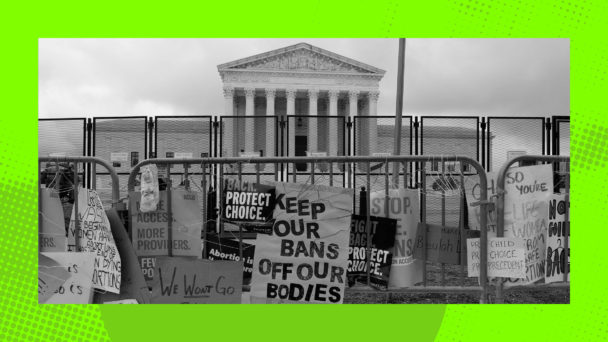On Tuesday, Wisconsin voters went to the polls for the most consequential U.S. election of 2023: the race for an open seat on the state’s highest court. They did not find the choice to be especially difficult: People turned out in record numbers to elect Milwaukee County circuit judge Janet Protasiewicz, who beat her conservative opponent, former Wisconsin Supreme Court justice Daniel Kelly, by a comfortable 11-point margin. Protasiewicz’s victory means that control of the court will soon be in the hands of a liberal majority for the first time since 2008.
Like most states in which voters elect judges, the election was technically nonpartisan, but the result is a lot easier to follow if you think of Protasiewicz as the Democrat and Kelly as the Republican. Protasiewicz touted her support for a “woman’s freedom to make her own decision on abortion,” and criticized the state’s legislative maps—among the most egregious pro-Republican gerrymanders in the nation—as “rigged.” (For reference, Democratic Governor Tony Evers was re-elected by three points in 2022, but the Republicans who drew the legislative maps enjoy a supermajority in one chamber and close to it in the other.)
Kelly was a tad more circumspect on the campaign trail, pitching himself as a by-the-book lawyer who believes the courtroom is merely a forum for “deciding legal distinctions.” Given that the man is an erstwhile anti-choice blogger who worked for Wisconsin Right to Life—and, more recently, for Republicans trying to overturn the 2020 presidential election results—his politics were not exactly a mystery, either.

Loser Dan Kelly, who lost, delivering his concession speech on Tuesday (because he lost) (Screencap via YouTube)
Part of the reason this race earned national attention is because Wisconsin’s government is divided between a Democratic governor and a Republican legislature, which means that the usual lawmaking process is hopelessly broken and judges wield a tremendous amount of policymaking power. (Sound familiar?) In the not-so-distant future, the Wisconsin Supreme Court will decide the fate of the state’s near-total 1849 abortion ban in a post-Roe v. Wade world. In a court controlled by conservatives, legal challenges to the state’s maps were dead on arrival, and abortion rights were very much in jeopardy. Once Protasiewicz takes the bench, the court will have the power not only to protect access to abortion care, but also to maybe, possibly make Wisconsin a functioning democracy again.
The tone of the race reflected the stakes, which is to say that it felt less like a contest between competing judicial philosophies than a bare-knuckle swing-district congressional race. Spending exceeded $45 million, more than quadrupling the record set back in 2020, when Kelly lost to liberal Jill Karofsky. The candidates engaged in testy debates, sent unhinged fundraiser texts, and ran grimy attack ads, some of which were in very poor taste. After media outlets called the race for Protasiewicz, she even took the stage to join hands with the three sitting liberal justices, not unlike a longsuffering minority leader celebrating alongside the freshman lawmakers whose win guaranteed them the speaker’s gavel.
WI Justice-elect Janet Protasiewicz joins hands with the three current liberal justices on the state Supreme Court as the four celebrate the new liberal majority. pic.twitter.com/pkTMz3ClVV
— The Recount (@therecount) April 5, 2023
Wisconsin Republicans are taking the loss like many Republicans take losses these days: poorly, and with a newfound appreciation for the merits of oligarchy. “I wish in a circumstance like this I would be able to concede to a worthy opponent. But I do not have a worthy opponent to which I can concede,” Kelly told supporters on Tuesday. “I wish Wisconsin the best of luck, because I think it’s going to need it.” Some Wisconsin Republicans are already flirting with the idea of impeaching Protasiewicz, which, to be fair, would not be the first time they’ve pondered meddling with an election result they didn’t like.
Maybe the most remarkable aspect of this election is how little Protasiewicz seemed to care about the capital-P propriety of discussing the perspective she’d bring to the job. “I can’t tell you how I’ll rule in any case, but throughout this race, I’ve been clear about what my values are,” she told supporters in February. Protasiewicz echoed this sentiment while discussing the state’s gerrymandering crisis in January, saying, “I can’t tell you what I would do on a particular case, but I can tell you my values, and the maps are wrong.”
This kind of language contrasts sharply with that which permeates the confirmation process for federal judicial hopefuls, who make a game out of revealing as little as possible about how they’d actually do the extremely important job they seek. “A judge sworn to decide impartially can offer no forecasts, no hints,” said Ruth Bader Ginsburg in 1993; doing so, she explained, would “display disdain for the entire judicial process.” In 1995, a hotshot young professor wrote a law review article mocking the confirmation hearing as a “repetition of platitudes” in which senators ask questions but “neither hope nor expect the nominee to respond.” The author, Elena Kagan, could only joke sheepishly about it when she clammed up during her confirmation hearings 15 years later.
This dynamic, the product of a legal profession organized around the fantasy that being a lawyer makes one special and different from everybody else, has yielded the confirmation hearing format we all know and hate. When asked about any hot-button issue that might one day come before them, nominees to life-tenured judgeships quickly resort to vacuous gibberish, even when everyone involved knows the answer. This peculiar little ritual is how we end up with people like Neil Gorsuch telling senators that Roe v. Wade is “the law of the land,” or Brett Kavanaugh calling it “important precedent,” or Amy Coney Barrett promising to “decide cases as they come,” only to vote to overturn Roe at their earliest opportunity.
Please do not mistake this as some enthusiastic endorsement of judicial elections. (When it comes to the process of picking lawyers with the authority to decide whom the law does and doesn’t protect, I am not sure there is a “good” answer, in any meaningful sense.) But in the states that do entrust that responsibility to voters, judicial elections should probably look like this one. If there is a silver lining to the civil rights bloodbath that is the modern U.S. Supreme Court, it is that the public understands that judges are and have always been political actors, not morality oracles. The least the people who sit on them can do is be candid about it.
Clip via YouTube
Historically, liberal would-be judges have been as cagey about their philosophies as their Federalist Society counterparts. The results in Wisconsin indicate that this strategy, at the very least, might have some drawbacks: In a contest where the stakes were high and the candidates relatively forthcoming about what they’d do with power, the anti-choice autocracy enthusiast got absolutely molly-whopped. As it turns out, representative democracy and bodily autonomy are more important to voters than rote appeals to the virtues of judicial humility; liberals who believe the law protects those things can feel pretty good about their chances of winning the argument. Judging by their rock-bottom approval ratings, if somehow forced to stand for re-election, your average conservative Supreme Court justice would get fucking smoked.
Protasiewicz’s victory is a nice illustration of the reason conservatives work so hard to control the courts, both in Wisconsin and across the country: The policy views they implement from the bench are unpopular, and the myth of the apolitical judiciary provides essential cover for their ideological project. By dispensing with this narrative, Protasiewicz offered voters an alternative, more honest vision of what it means to be a judge. It’s not an accident that they rewarded her for it.




